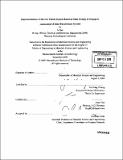Implementations of electric vehicle system based on solar energy in Singapore : assessment of solar photovoltaic systems
Author(s)
Sun, Li
DownloadFull printable version (44.17Mb)
Alternative title
Assessment of solar photovoltaic systems
Other Contributors
Massachusetts Institute of Technology. Dept. of Materials Science and Engineering.
Advisor
Yet-Ming Chiang and Andy Chu.
Terms of use
Metadata
Show full item recordAbstract
To evaluate the feasibility of solar energy based Electric Vehicle Transportation System in Singapore, the state of the art Photovoltaic Systems have been reviewed in this report with a focus on solar cell technologies. Various solar cell technologies were evaluated based on characteristics such as efficiency, reliability and cost to identify a best working one under Singapore's hot and humid climate. Commercial CdTe modules were found to have the best efficiency to cost ratio, making them the best module choice in land-scarce and tropical Singapore. Based on the market price and characteristics of CdTe modules from manufacturer First Solar Ltd, two PV systems based on an apartment model and a private house model were evaluated. The cost of electricity from a relatively large scale grid-tied PV system is found to be at around US$0.173/kWh which is not market competitive with the utility electricity price of US$0.109/kWh in Singapore. But with enough capital funding and government incentives such as rebate or feed-in price tariff, PV electricity generation could become economically feasible. The small private house system is found not economical as a means of household electricity generation even with current status of government rebate. When carbon trading is considered, the current trading price has to be increased by around 7 times of the current value or 3 times of the predicted price at 2016 to offset the difference with the utility electricity price.
Description
Thesis (M. Eng.)--Massachusetts Institute of Technology, Dept. of Materials Science and Engineering, 2009. Cataloged from PDF version of thesis. Includes bibliographical references (p. 150-156).
Date issued
2009Department
Massachusetts Institute of Technology. Department of Materials Science and EngineeringPublisher
Massachusetts Institute of Technology
Keywords
Materials Science and Engineering.